Compared to Turin, and even Beijing, the Vancouver 2010 Olympicon is perhaps the first major sporting spectacle to bear witness to the rise in social media. Compared to the ’90s advent of Indymedia, social media is a very different beast. Indymedia came about as the convergence of traditional alternative media (such as college & campus radio, ‘zines, underground newspapers and pamphlets) with emerging internet technologies of self-publishing. When Indymedia saw its first introduction at APEC in 1997, going on to become a full-fledged, independently developed technical web platform for contributors with a centralized media hub at the Seattle ’99 WTO convergence, it provided effective coverage not only because it aired the footage of, and granted time to, perspectives that mainstream network-based television was either unable or unwilling to provide, but because it did so from a concentration of independent, alternative journalists who, though they may have differed as to the precise orientation of their political convictions, all agreed upon the common need for an alternative media network to represent the unheard side of the story.
In so far as social media has engaged the earlier, more politicized forms of alternative media, it has done so almost by default of its omnipresence, as it provides street-level coverage from the now ubiquitious photo (and video) capable mobile handheld, with content directly uploaded to Flickr, Twitter or Facebook. While media hubs such as W2 in Vancouver have provided physical space to nonaccredited journalists of various stripes, such centres proclaim neutrality, and do not aim to provide the same collective media convergence of the Indymedia centres (the centre that did aim to do so, VIVO, had its low power FM radio station shut down). Indeed, closest to Indymedia’s heritage at the Olympicon is the Vancouver Media Coop for its critical reportage. But the social media hub of the Vancouver 2010 Olympicon has been True North Media House, which offers a self-accreditation process, print-out media badge, and a few online hubs for agglomerated content (Flickr photo pool; RSS firehouse of agglomerated content, and #tnmh hashtag search on Twitter). Unlike Indymedia, there is no agenda to “take on” the mainstream media as an alternative perspective. In this sense, TNMH is form without content, and purposely so. It seeks to provide only aggregation, and not a platform for publication. In this sense, it is your Twitter account, blog or Flickr page that becomes the venue; unlike Indymedia, it is a decentralized rather than centralized attempt at news gathering.
But is it even news gathering? Is it documentation or journalism? What is social media, precisely? This question came up at the Freshmedia conference on social media hosted at W2 during the Olympicon. The conference sought to explore the question “How has social media transformed the Olympic story?” From my own observations, I am not sure social media has transformed the Olympic story in any significant way. The Twitter channel #tnmh primarily reflects a mix of cheerleading approaches, with most tweets echoing what the mainstream media is already reporting in realtime – who scored a goal, who won a race, pictures of crowds on Robson, protests in the Downtown Eastside. Besides coverage of primarily W2 events and a few smaller happenings, TNMH has not broken a story nor exposed a perspective not already covered in the larger mediasphere.
As a TNMH self-accredited “social reporter” myself, I have used the TNMH channel to try and disseminate articles from the alternative press about the Olympics, or even to juxtapose conflicting articles from different sources. For the most part, these tweets have not been retweeted, which means few Twitter users see them as worthy of disseminating to their followers. The tweets that are retweeted the most usually focus upon content from social media journalist and photographer Kris Krug as well as convivial though contentless (for a journalist) social observations on Olympic events. In short, the channel reflects a hierarchy of content and not a horizontal distribution of alternative viewpoints. Its contributors also do not appear to work toward a collective process; they retweet popular content, thus clogging the channel with more of the same, but do not interrogate each other’s content in an attempt to produce more work, verify it or question it. To address the questions raised at the Freshmedia conference, social media on this level is not journalism, insofar as it does not perform the most basic task of asking questions and verifying reports. That said, the #tnmh channel also features links to blog posts from about a dozen contributors, each of whom provide different viewpoints on the Olympic spectacle. In this sense, the TNMH RSS firehose feed, rebroadcasted at @tnmh, provides a better insight into the diverse content being produced. That said again, is it documentation or journalism? And once a blog article (as this one), is it “social media” or does it not revert to a fragmented form of indie journalism?
These questions are complex, though they reflect, to a degree, the technical structure of the software itself — social media is not a filter nor a concentrated platform; it is an agglomerate of channels, and with Twitter especially, content is limited to 140 characters. Beyond Twitter, digital photographs are the preferred medium (written blogs are a now distant third; and long analysis, such as this, dead last – thus guaranteeing this post’s stillborn obsolescence). While I am not out to critique any kind of apparent “lack” of politics given the open door format of TNMH, and the constraints of the underlying technology (though it leads to all kinds of questions concerning the sociopolitical limitations of these embedded technological constraints) it does appear that in this particular scenario, right here & right now at the Vancouver 2010 Olympics, social media does not seem to possess the same degree of self-consciousness as to its potential power as previous alternative media networks. Instead, it appears more concerned with reporting what we already know by way of a kind of convivial online chit-chat, and is perhaps more interested in reporting about itself, as Kris Krug’s article for PBS Mediashift demonstrates. There is a narcissism to social media reflected in the drive toward quantity over quality: more tweets, more followers, more people retweeting you, all adds up to more social prestige, more online cultural capital. Is that all there is to social media?
While social media already exists, we don’t know why it exists for us — or for what it could be used for beyond its drive toward the virtualization (and quantification) of social relations (“facebook friends” / “followers”) and perhaps in the final assessment, corporate datamining. This is the reverse of Indymedia, which knew why it wanted to exist, and sought out the web tools to see it realised, and then went on an unpredictable journey to see how these tools could be put to use. But unlike 1997-2004 or so, Indymedia is no longer the mainstream media’s “media story.” And how convenient this is: that apparently democratizing social media has now taken up the mantle as the “voice of the people” only to reveal it has little, if anything, to say. Was Indymedia overcome by social media only to see its alternative collectivization of journalistic activity fragmented into conveniently apolitical soundbytes? Has alternative media culminated, then, in a lack of critical and self-reflective thought as it becomes social media?
It’s worth picking out a few examples of what I mean. The first is an obvious tag spam from @texturasalon. By including #tnmh in this message, it shows up in the #tnmh feed. When a corporate interest does this to a reportage hashtag, it is known as tag spam.
For the record, Textura Salon apologized for doing so when called out on their advertising tactics. But in some ways, this kind of tag spamming is so overt that it is like traditional advertising: it is very easy to identify, and any kind of complaint over the tag spam produces undesirable backlash.
Perhaps more complex, and thus all the more telling, is the following exchange surrounding @adhack, which began when a number of #tnmh Twitter accounts retweeted the following: “Still time to enter your Olympic ad photos to win a cool prize from Adhack: http://olympicadawards.com #tnmh.” A glance at Adhack’s website revealed a contest, taglined “People Powered Advertising,” where contestants could win “a cool prize” of “original artwork from a Vancouver artist” for “Best Ad Photographer” and “Best Brand at the Olympics.” The accompanying video was entitled “Celebrating the Best Ads at the Vancouver 2010 Winter Olympics.” Evidently the Adhack website and campaign uses the (free) resources of photographers and social media to, at the surface, gather documentation of various ad campaigns ongoing during the Olympics. In this sense, it perpetuates relations of precarious labour by dressing-up unpaid labour with a lure of glamour (the contest). [see k-punk’s further meditations on precarious labour here]. Below the surface, the campaign collects data on who is participating, with the bonus of aggregated metrics on social media participation in ad campaigns (who is willing to volunteer unpaid labour for a prize). So as well as gauging the success or failure of diverse campaigns in various kinds of ways (which campaigns received the most exposure, from whom, at what time, for what reasons, etc), Adhack’s use of TNMH to advertise its campaign also blurs the line between “social reporting” and public relations.
Given the embedded technological constraints within Flickr, Facebook, Twitter and so on, it is perhaps worth asking if there was any such line between PR and social media to begin with. Unlike Indymedia, which sought to construct its own web software for collective and unmediated journalism, social media uses widely-available (and of course popular) corporate social networks whose entire existence is designed to gather and aggregate mass amounts of data, from metrics to network relations, which is then sold to all manner of entities, both private and public. So to assume that PR and social media isn’t already downstream from a privately-controlled datamining operation is to, perhaps, maintain something of a false hope, if not an incorrect assumption. Indeed, a resulting discussion with @jordanbehan, who tweeted me to let me know it was him who put the #tnmh hashtag into the Adhack tweets, revealed something of the perspective in which social media users view social media as a platform. [UPDATE: see our thoughtful discussion below in the Comments – and for the record Behan has no owned interests in Adhack]. Behan responded to my tweeted question “so in socialmedia, x-over with PR interests OK? because in journalism, it’s not” with the (public) tweet:
As Behan writes below in the comments, these 140 characters are not enough space to get into his comment on journalism, which is well taken (and this alone – the technological constraints on expression – could nearly summarize a large aspect of this post – which does not imply a technological determinism, but a determination of limited technologies). Besides that it is difficult to ascertain what “disclosure” means in this context, it begs the question. If newspapers and other media have vested interests, this does not mean that journalism itself has lost the ethical high ground (and if it has, should not alternative media struggle to regain it?). Moreover, should the compromised sponsorship of corporate media mean that social media must cross the same line? If social media follows from the acceptance of sponsored media interests, then it becomes a pale imitation of corporate media conglomerates; certainly it cannot live up to its hype as the “democratization” of media.
Fundamental differences arise between a privately owned newspaper, with its command & control hierarchy, and a social media hashtag associated with a self-accredited media disorganisation and its website (which ultimately has no control whatsoever). Which is why the concept of “community” – or rather the question of who owns this concept, who brands it & wield its signifier – is central to defining, and thus exerting control over, social media (and this control, at this level, takes place through symbolic networks and peer influences in channels like Twitter). Thus the larger question to address is one of “community,” as Behan notes. Is there such a thing as a “community” around an ad campaign? To claim that there is community when there are only contest participants seems to devalue the concept of community; the same goes for consumers and business associates. [See below comments: as Adhack is a “marketplace made up of independent ad creatives” – and not a traditional company – does this make it a community? The medieaval world for a delimited marketplace of producers was a guild, which is perhaps more accurate here than community. Or have the conditions of contemporary capital completely collapsed these distinctions?]

A community tears down the walls at APEC '97, broadcast in real time over cellphones on CiTR 101.9FM & streamed worldwide to the Net. Before the Prime Minister's handlers knew what had happened, Nardwuar was asking Chrétien about the incident. Result? "Pepper, I put it on my plate." photo: the Ubyssey (I was standing to the left – cell phone in hand.)
Is TNMH a community? To a degree, yes, insofar as the communal, or what is held in the commons, without ownership, is the shared output of (mostly unpaid) social reportage, and to the degree that many of its participants know each other and are engaged in collective labour toward perspectives and even ends that although different, are the product of social reportage and not advertising. What is common, and thus communal to TNMH is that it is reportage, and not advertising. What all of these questions reflect is the battle over – and ultimately the appropriation of – the meaning of the signifier “community,” and consequently, what is appropriate to and for that community, as well as what can appropriately represent that community. Following this line of thought, I tweeted surprise at the retweeting of the Adhack campaign, questioning the relation between social media and PR. Let me lead you on this tale, for it revealed a set of distinctions between different kinds of corporate involvement that became murky indeed.
Indeed, my tweet invoked a critical response of its own. Apparently the use of the word “spam” provoked some wrath as Adhack is a “community member” in the local Vancouver tech/arts scene. Kris Krug, author of the PBS Mediashift report on social media at the 2010 Olympicon, responded with:
Not to pick on Kris Krug (whom I respect immensely), but his (public) response led me to further questions: why is asking a question concerning the popular retweet of corporate public relations campaigns a “fail”? Who is this “we” who support Adhack? Should I be supporting Adhack if I support TNMH? And why is a tweet considered an “analysis” (aka a judgement) when it asked a question (as journalists are wont to do)? As a journalist, it was time to begin asking questions. If Adhack isn’t spam, given its placement of tag spam in a Twitter channel for social reportage – and doing so by enlisting, conscious or not, members of the TNMH “community” to retweet their tag spam – then I’m not sure what is — or isn’t. In any case, I thought if social reportage was to be self-reflective, perhaps this was the time for it to be so. (Note: I do hope to continue the conversation with Kris Krug at a later date — this by no means is meant to reflect the totality of his thought on the matter.)
At this point, the discussion went private with Kris Krug, and so I won’t reveal the tweets here, as “direct messages” are not readable by public members and so retain at least something of the apparent ethics of a private letter. That said, I can probably summarize the content (which was thoughtful & amicable). Unlike the dynamics of many an email list, the exchange did not lead to a flame war. Indeed we both commented on how inadequate 140 characters is to have a meaningful discussion (or even a dispute). But what Kris told me was that Adhack is a “community partner” – they support grassroots geek events like Barcamps, TNMH, Northern Voice and W2 by contributing skills and knowledge. In short, they aren’t “spammers” (which I was taken to task for in my use of “Adhack spam”). But what I wanted to know was: is Adhack use of TNMH feeds an acceptable use of social reportage? Indeed, Coke sponsors community events too – such as the Olympics. So where is the line drawn? As Krug responded, if Coke tagged #tnmh they’d be “tag spamming” as they have never contributed anything to the channel or local tech/arts community; but also explicit was a fundamental rejection of a corporation such as Coke (“fuck Coke”), which leads us to fine distinctions between corporate entities. So while large-scale corporations such as Coke are unacceptable if they use a Twitter channel such as #tnmh to promote a campaign (tag spamming), local use by a local advertising firm is acceptable, provided they have contributed in other ways to the tech/arts community.
And this, it appears, is the heart of it. What are the aspirations of social media? As Jordan Behan noted, is social media already compromised by the reportage of mainstream media (given corporate ownership and biased support of various agendas), thus offering no alternative? Or, perhaps more disturbingly, is the grassroots deployment of social media by advertising firms the only available model for building “community”?
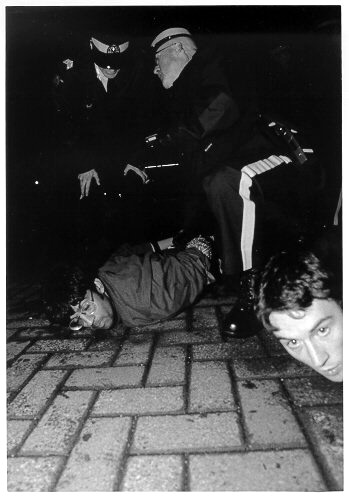
Jaggi Singh taken down at APEC 97, as captured by the Ubyssey, some 9 years before Twitter, 7 years before Flickr, but on CiTR radio within minutes and online that night.
What alternative Indymedia sought to do was build community by building technologies and platforms, by giving voice to a multitude because issues and questions were not being represented in corporate media. Social media, by contrast, has not emerged from a social necessity to break down the wall of corporate and mainstream media. By contrast, social media has emerged from the corporate necessity to turn a profit from the increasingly fragmented mediasphere. Though “social reporting” has taken up residence in the house of social media, it does not own the building. It’s a tenant without a lease.
That said, it was Indymedia that sunk the foundations.
Marx once wrote that history repeats itself twice: first as tragedy, second as farce. I’m not sure which is which here, but what Indymedia started has been largely forgotten in contemporary social media. Distribution of ubiquitous mobile technology and easy-to-use corporate platforms of distribution has not produced the same level of citizen journalism and self-consciousness of reportage evident over a decade ago. Indeed, the second time around appears to have limited the impact of alternative media, not enhanced it. Quite simply, we have not witnessed the serious undermining of corporately-held media, whether traditional or in the social/new media spheres.
There are speculations to be had — that the corporate interests behind social media capitalize upon spectacles such as the Olympicon to generate the image of community involvement while delimiting its actuality. While I expected this everywhere at the Olympicon, I did not expect this kind of corporate entanglement to underlie the apparently independent conglomerate of interests that is TNMH, nor did I expect a general acceptance of vested corporate interests. Is the “new normal” of reportage reflective of entangled corporate interests? Are corporate interests OK if the corporation does enough to integrate itself within apparently independent “community” activities? What does this say about social media? Only that it is no better than or worse than mainstream corporate media — sans the fact-checking processes of journalism.
However, it reveals quite clearly that alternative media platforms, such as the Vancouver Media Coop, and larger media outlets such as the Huffington Post or in BC, the Tyee, though less hyped and less glamourous, are nonetheless better signs of media “democratization.” Social media hasn’t sold out; it never had anything to sell, as it was produced, packaged & sold by corporate interests to begin with. Does this leave vantages from which to undermine its embedded interests and turn its channels to other purposes? Yes indeed – but only as long as they allow you to keep contributing. Otherwise, and ultimately, it’s account deleted.
==./ transmission out
Tags: cognitive labour, precarity, protest, social media
.tinyUrl for this post: | https://tinyurl.com/y25pg9lr .



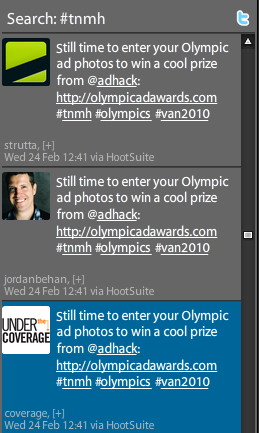
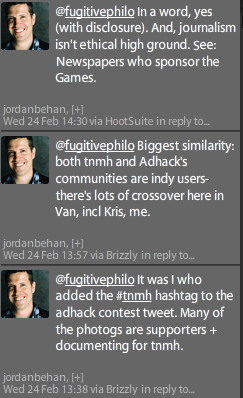
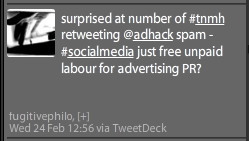
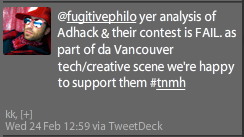
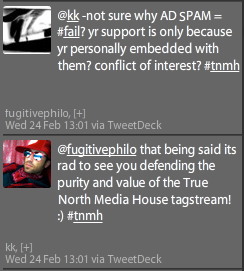
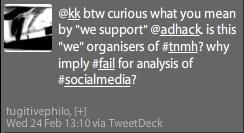
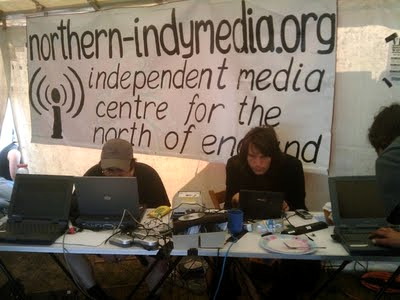





 RT
RT 
Hey Tobias,
I appreciate your analysis, and I think its mostly fair.
For the sake of clarity though, and the want to hear the sound of my own keyboard, I felt compelled to defend my position.
As I’m sure Kris mentioned during your emails, not only is Adhack (of which I own no interest) a contributing community member company, but it is also a marketplace made up of independent ad creatives, photographers, etc. THERE is your key difference with the likes of Coke, in your examples above. I am one of these member creatives, and it is in that capacity (as well as as the software provider to the contest -Strutta) that I tweeted the link. (This does not forgive the triple tweet- they’re all me. *Guilty)
I’ve already clarified (on Twitter) what I meant by “journalism does not = ethical high ground,” (damn that 140 char count) -just that the mainstream media seem to be becoming masters at PR cross-over, more often that not without full disclosure of their conflicts. I certainly did not mean to use it as an excuse for my actions, or to draw any comparisons.
Lastly, in my opinion, social media doesn’t need to be either journalism, nor social reporting, or anything else. And I resent the implication that social media has “has little, if anything, to say.” On the contrary, I celebrate the fact that anyone can say anything, all from our own perspective, and we all have the choice to filter it all as we see fit.
Thanks for the discussion. My only hope is that this post has the “stillborn obsolescence” that you predict. That triple-tweet is a bit embarrassing. Nice catch.
hey Jordan, thanks for writing. Indeed, I am still working the post — I threw it out there but haven’t disseminated it yet, though I gather the TNHM firehose has already picked it up, & voilà, you picked it up.. point being I am trying to refine my thoughts on the matter. It’s probably worth noting that this blog, and my research, is conducted as a political theorist / philosopher of technology, and that the kind of questions and analysis I undertake follows from a sociological & deconstructive desire to take apart to pieces the everyday. My apologies for that.
So ya, as I writ about Kris, by no means is any of this meant as a critique of you or your tweets – which is why I am trying to ensure what I have to write is abstracted to larger considerations based upon close to two decades of involvement in alternative media.
I appreciate your comments. That Adhack is a contributing member company is I think ultimately of little significance (so is Coke etc; this is basically just sponsorship, whatever way it is spun), though what you have to say about it being a “marketplace made up of independent ad creatives” is interesting. I’d like to know more. But I think it’s fair to reply that the structure of a corporate interest does not divest it of being just that – a corporate interest running an ad campaign, in this case by conducting a contest, with all that implies when a corporation uses free participant labour to generate hype, research and data. That this data goes to a collective marketplace of interests and not a hierarchy of owned interests (shareholders or private investments) is, again, of less significance than all the more contentious grey issues surrounding the apparent hybridity of social media and social advertising.
As for social media having little, if anything to say — yes this is a harsh assessment, and you are right in calling me on it. Perhaps I need to further contextualize and refine this point. I make it, however, in comparison to the comparable effects of previous efforts in alternative media, but also by virtue of the limitations of social media’s structure. In short, social media can’t communicate the kind of discussion we are having here. It can merely refer to it in 140 characters (Twitter), enclose it within a walled garden (Facebook) or a corporately owned photo resource (Flickr). And all of these platforms, of course, can be switched off or censored; moreover they are designed solely as datamining aggregates for advanced advertising.
True, we can celebrate a multiplicity of voices, but this multiplicity existed prior to social media; back to the ages of the common rabble. That social media has granted a simplicity of dissemination for the average internet user is probable but not certain, as there have been such platforms before. Certainly there has been both a convergence of media and an acceleration of worldwide dissemination through mobile platforms — and this is having a massive effect on the way in which information is produced and perceived. But I think what I am trying to draw out here is that previous platforms have been socially and not corporately constructed (such as Indymedia’s software) in response to a social need, to a desire, to create the means for a defiant message untold in mainstream media. While the public adoption of the Net saw John Perry Barlow’s Declaration of the Independence of Cyberspace, and the late ’90s saw Indymedia’s platform that usurped mainstream coverage of alterglobalization, what can be cited as a comparable achievement from social media? Is it too early? Or is all that it can amount to, by virtue of its corporate origins and restricted form, is a kind of convivial chit-chat, celebratory of its voices, but without much more beyond its numbers?
Don’t get me wrong, these are open questions .. which is why I think they need some hard pressed thought.
Btw, since I began thinking about yr well writ comment, Canada has destroyed Russia and the CDN women have taken 1 & 2 in the bobsled. Hot damn.
I don’t have time to read all 3300 words of this post, and I’m disinclined to drop links to my own blog, but I genuinely think this recent post applies:
http://bit.ly/biv6Tf
I’ve framed it as “covering” the news versus “uncovering” the news, and by asking the question “who’s doing the citizen journalism that isn’t fun?”
Indeed, it’s a long post — always too long for the Net. Thanks for yr link & post. It’s absolutely bang on, and your distinction between covering vs uncovering the news captures the difference well.
Very interesting discussion Tobias, thanks for bringing some depth to my evening’s internet shred. Especially liked:
“While social media already exists, we don’t know why it exists for us — or for what it could be used for beyond its drive toward the virtualization (and quantification) of social relations…”
“It is perhaps worth asking if there was any such line between PR and social media to begin with…”
thank you very kindly for shredding by ..
Amazing Thought provoking post.
Old media, social media, even thetyee is driven by people; people have interests. shareholders are people. In a perfect world we can “all dance together”. Marketing follows, it comes from one person or it comes from a business representing the people making a living through it. The social can’t be seperated from the media.
Jordan: busted for triple tweeting sentenced to use only web based Twitter for one day 😉
Indeed, it’s about people, but to paraphrase Bruno Latour, objects are people too in this “parliament of things” that is the technologically mediated world. In short, what objects we engage with determine what kind of people we are to the same extent that what kind of people we work with shapes who we are. And the same goes for objects: they become what they are through their relations with us and other objects. So perhaps the objects at our disposal because of their ease-of-use (social media) are shaping us in ways we are only coming to realise (convivial chit-chat over investigative thought).
Anyone know where I can find more of this?? (i.e. thoughtful analysis of “social media”)
Check out the below discussions with Venkat, and Venkat’s blog Ribbonfarm ..
RT @ehlympics: RT @TNMH: Important discourse RT @kk: Social media & its discontents http://bit.ly/dcUzx2 #tnmh #olympics #van2010
RT @ehlympics: RT @TNMH: Important discourse RT @kk: Social media & its discontents http://bit.ly/dcUzx2 #tnmh #olympics #van2010
RT @TNMH Important discourse RT @kk: Social media & its discontents http://bit.ly/dcUzx2 #tnmh #olympics #van2010
RT @TNMH: Important discourse RT @kk: Social media & its discontents http://bit.ly/dcUzx2 #tnmh #olympics #van2010
social media & its discontents « fugitive philosophy http://bit.ly/c5c9tH #fb
social media & its discontents « fugitive philosophy http://bit.ly/aDQGL0
social media & its discontents « fugitive philosophy: The tweets that are retweeted the most usually focus upon co… http://bit.ly/cjSm1z
@georgedearing – link to @awsamuel piece on social media? FYI you both might be interested in this: http://bit.ly/bOiTyc #van2010
Just stumble on this and haven’t had a chance to finish reading the entire piece but this is fantastic analysis.
thx Kim. just checked out yr blog; I dig yr analysis there of Twitter as medium.
Enjoyed the piece tobias; I recalled it today on encountering the passage below from some late Deleuze and Guattari. They talk about a subtle relationship between truth and orthodoxy, where different situations and encounters in life generate a base doxa from out of the qualities of perception, affection and communication. Groups form by focusing on these qualities as shared criteria for collective opinion. The line you mark, between convivial talk and the investigation of the truth in Twitter and social media, is an interesting example of the negative effect they warn against here:
“…opinion triumphs when the quality chosen ceases to be the condition of a group’s constitution but is now only the image or “badge” of the constituted group that itself determines the perceptive and affective model, the quality and affection, that each must acquire. Then marketing appears as the concept itself: “We, the conceivers. …” Ours is the age of communication, but every noble soul flees and crawls far away whenever a little discussion, a colloquium, or a simple conversation is suggested.” (What is Philosophy? p.146)
Though that sounds a bit harsh in light of me being commenter #37 or whatever… Nevertheless, I think what you suggest in your post is similar to the tension they go on to discuss, which goes back to the Greeks —
“Philosophers blamed the sophists not for confining themselves to doxa but for making a bad choice of the *quality to be extracted from perceptions*, and of the generic subject to be isolated from affections, so that the sophists could not reach what was “true” in an opinion: they remained prisoners of variations of the lived.” (p.147)
Keep on fleein’.
Thanks for the comments, indeed. At first D&G sound like they are pursuing the line between doxa and sophia (opinion and truth) by way of distinguishing between phanaisthai (what appears /presence ) and simulacrum. But the latter para you quote is a very important qualifier in this respect, because if all is formed from collective doxa, then all is simulacrum. Thus the distinguishing characteristics of the good and the bad (or as Deleuze often writes, of “stupidity”) concerns “the quality to be extracted from perceptions,” which is where D&G insist upon affect to ensure the proper extraction (Simondon) of the particular – Duns Scotus’ concept of haecceity – from the thing. In this compressed reading, there arrives an ethics of perception by way of the training of collective affect. One does not learn to be ethical by thinking it (rationalizing it), but by feeling it in the collective doxa of the group, insofar as that collective doxa generates an appreciation for the particular qualities of the thing. Marketing, in this sense, would be a collective doxa that develops an appreciation not for the haecceity of the thing, but for its generality, its image, and its affect, one would imagine, would be of a thing easily assimilated and consumed (or as Derrida by way of Freud writes: introjected & not incorporated).
Anyway, just a note to see that D&G are still more complex than the average bear, and quite (cough) close to a deconstructive reading of simulacrum, and that I dig yr reading, as I haven’t been pursuing the connections on this level .. thx for gearing up the brain.
A thoughtful analysis, Tobias. The statements in your last paragraph – that social media has been sold to us by corporate interests to begin with but still has far more democratic potential than traditional media – particularly resonates with me.
We can’t ever expect anything meaningful to be completely free of “selling out” and corporate packaging because that’s just what happens to everything in modern Western culture (see: Commodify your Dissent). But that doesn’t mean some forms of media can’t be more democratic, more egalitarian, more meritocritous than others. And I think social media, if done well (and that’s a big if) has that kind of potential.
In one word: precisely.
[…] and asking the commenter to take his thoughts elsewhere. That’s too bad, because he writes in-depth on the very subject at hand and participates to good ends in comment-based discussion, even with […]
Interesting angle on social media from the underground perspective:
http://fugitive.quadrantcrossing.org/?p=340
Great and much-needed discussion.
“[With] the recording of every event…everywhere without perceptible interval of time the world is for purposes of intelligence reduced to a village…All men (sic) are compelled to think of all things, at the same time, on imperfect information, and with too little interval for reflection…the constant diffusion of statements in snippets, the constant excitements of feelings unjustified by fact, the constant formation of hasty or erroneous opinions, must, in the end, one would think, deteriorate the intelligence of all to whom the telegraph appeals” (“The Intellectual Effects of Electricity”, Spectator, 1889).
Maybe we’re witnessing the farce now, & not the tragedy?
Thanks for quoting the Spectator. The telegraph is indeed the basis of the collapse of space/time that engenders the rise of stock markets, transnational capital, the quantification of future temporalities, and ultimately the forms of cognitive capital that now are risking multiple collapses in the 21C. There’s a thesis here on the relation of capital to temporality and collapse that needs to be better extricated (post-Marx bein oui) — just received final copy of -Crisis in the Global Economy- (Semiotexte 2010) and I am looking forward to dissecting that.
Btw, caught up on yr blog, read with some hilarity the mix of toddler & Stiegler. I can’t imagine. Is it tragedy or farce? Just human development, eh?
Funny, the mix of theory and child-rearing. Here I’d completely missed the resonances of Stiegler with my harried grappling with the technical systems that modern toddlers come pre-entangled with (scarce childcare, neoliberal govts, RESPs, future potentialities, etc.). Sadly, I was too busy contemplating Thomas the Tank Engine as a boundary creature. Now, in addition to your book tip, I’ve got way more thinking to do. Thanks, I guess.
I suppose in hindsight it’s farce. 🙂
late to the party (#blamethecomps), but this chat is more intriguing than the Nic kel Bac k/S.Harpe r thing: http://is.gd/c3rKo
Duly noted: social media & its discontents « fugitive philosophy http://ow.ly/18k5L2